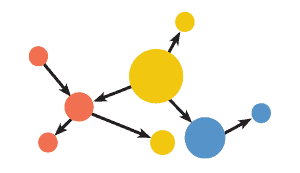Data Model-Driven Strategy
Are you struggling with data and how to get the most value out of it as a food manufacturer? Data Science has emerged as a powerful tool in a large number of industries. Such as retail, finance, and supply chain. However, little has been done with it in the food industry.
This blog explores how Data Science can help your company to compose the optimal product portfolio. We explore how it can be used to forecast a product's performance, uncover hidden relations between products, and identify customer needs.
Starting out with Data Science can be overwhelming at times. you can find a lot about it on the internet. But to begin our story lets first get a clear understanding of what Data Science entails:

By applying Data Science, food manufacturers can make more informed decisions on what products to keep or discard.
Data Science assists portfolio managers in a number of ways. First, it can provide insights into which products are most likely to be successful. Analyzing historical sales data reveals patterns offering insight into the future performance of a new product or similar products. Algorithms that can help you with this are SARIMA, ARIMA.
Second, Data Science can help optimize the mix of products in a portfolio. By analyzing historical sales data it is possible to uncover previously unknown associations between products. This provides product portfolio managers with additional insights next to metrics like revenue and volume, in their product-portfolio-management-process. The algorithms that can help you with this are ASSOCIATION RULE MINING or MARKET BASKET ANALYSIS.
Third, it can help improve individual products in a portfolio. Analyzing online reviews, social media, and tweets helps identify and understand the product's social sentiment for informed decision-making. Data Science algorithms that can get you started with this are SENTIMENT ANALYSIS or TEXT MINING.
By using Data Science methods companies get a clear insight into their customers’ behavior, preferences, and current sentiment. When using this insight it leads to an optimal product portfolio that meets the customer’s expectation.
Product data, whether internal or external, stands as a goldmine for companies aiming to optimize their product portfolios. Yet, in the food industry, many struggle to fully leverage this resource. This section explores a client example, highlighting Data Science's pivotal role in rescuing their product portfolio through effective algorithms.
In the food industry, product evaluation often centers on revenue and volume metrics over a specific timeframe. However, this conventional approach sparked a crisis for our client, involving major customers accounting for 35% of their annual revenue (approximately EUR 87.5M).
Opting to divest a low-revenue, low-volume product triggered swift and intense backlash from two significant customers in our client's portfolio. Within 30 minutes of informing a small customer group, phones were ringing with threats to take their business elsewhere. Account managers were bewildered, prompting an immediate retraction of the product divestment.
During this tumultuous period, we were enhancing the client's data and analytics platform with Data Science features. Urgently tasked with analyzing the purportedly underperforming product, we aimed to uncover any overlooked aspects.
Following the usual product portfolio process, evaluation based on revenue and volume, they overlooked a vital detail; it was a service product.
This realization emerged after applying the Data Science algorithm known as ASSOCIATION RULE MINING (ARM). ARM revealed a robust association between the service product and high-revenue, high-volume items, offering a comprehensive understanding of customer preferences.

Integrating ARM and other Data Science features into the product portfolio management process addressed potential crises, rendering them a thing of the past. The next phase for our client involves collecting, analyzing, and combining external data with their internal dataset.
Through the use of Data Science, you can analyze your company’s product portfolio from a whole new perspective. By analyzing past performance, Data Science algorithms enable us to also predict future trends for similar products.
It aids in understanding popular products, top revenue generators, and strong associations between products, offering valuable insights for decision-making.
It helps the food industry by analyzing factors such as perishability, seasonality, and consumer preferences specific to food products.
Industries like retail and finance have established Data Science practices. Adapting these techniques to food manufacturing requires considerations like supply chain complexities, nutritional data analysis, and food safety regulations.
Algorithms are used to identify food trends, optimize pricing strategies, or enhance supply chain efficiency. The outcome of these techniques serve as additional input for the product portfolio management process.
Challenges such as data quality issues, privacy concerns, and the need for specialized domain knowledge can be encountered. Overcoming these obstacles involves initiatives like data cleaning and normalization procedures. Thereby,ensuring compliance with regulatory standards such as GDPR or FDA regulations.
Secondly, we need to ensure close collaboration between Data Scientists and domain experts to interpret results and make informed decisions.
Data-Driven Pricing in the Food Industry
How blockchain improves Food Traceability